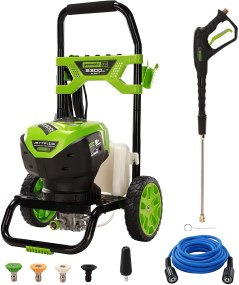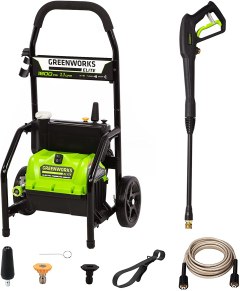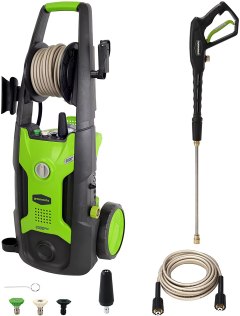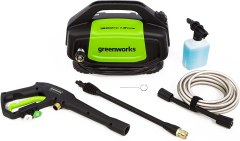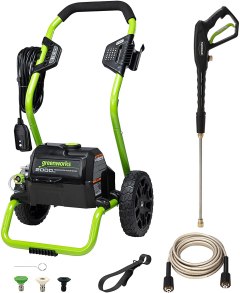Buying guide for Best Greenworks pressure washers
A pressure washer is a great tool to have on hand because it can be used for a variety of tasks that are difficult to accomplish without one. Whether you need it for cleaning a large patio or narrow nooks and crannies, with proper use a pressure washer can make even the dingiest surface look like new. Greenworks pressure washers come in a number of different configurations and power levels, and your choice depends on how you plan to use it.
Greenworks manufactures a wide range of outdoor tools, including an entire lineup of pressure washers. While all of them are aimed largely at the homeowner, some of the high-end models blur the line between home and professional use. To choose the right model for your needs, it’s important to think about what you plan to use the pressure washer for, how often you plan to use it, and how powerful the machine is.
That’s where we come in. Our shopping guide has lots of information to get you started. If you’re ready to buy, check out our top picks, too.
Key considerations
There are a number of factors to consider when looking for the Greenworks pressure washer that’s right for you.
Pro vs. household
The biggest factor when choosing a pressure washer is whether you’ll be using it professionally or around the house. There’s a tremendous difference in the quality and durability of models designed for these two broad categories, as well as a degree of overlap in the more expensive models.
Gas vs. electric
One of the biggest decisions you’ll need to make when choosing a pressure washer is whether to go with a gas- or electric-powered model. In years past, this was one of the deciding factors in whether a model was designed for professional or household use. Gas-powered pressure washers used to offer far more power than their electric counterparts, but that distinction has diminished considerably with modern pressure washers. Many high-powered electric models are well suited for professional use. Since Greenworks only manufactures electric pressure washers, it has been on the cutting edge of pushing the performance of these machines into the professional realm.
Power
A pressure washer’s power is rated in two ways: pressure, which is calculated in pounds per square inch (psi) and water flow rate, calculated in gallons per minute (gpm). While any pressure washer can tackle virtually any task, the greater these two values, the faster you can finish a job.
Caution
Don’t use a pressure washer from a ladder. The powerful spray can kick back enough to knock you off balance.
STAFF
BestReviews
Greenworks pressure washer features
Nozzles
It’s important to look at the nozzles that come with a pressure washer. There are two main types: adjustable spray nozzles that let you control the spray pattern and quick-connect nozzles that are set to a specific, predefined pattern. If the model you like doesn't come with all the attachments you need, you can find universal pressure washer attachments.
Tank
Another feature to look for is the kind of cleaning system the pressure washer has. Some units include a tank that holds the cleaning solution. Without this tank, you’ll need to manually apply the cleaning solution from a bucket or standalone sprayer.
Wheels
These might seem like a minor feature, but they can be a big factor, especially when working with a larger unit.
Hose
While it might not seem like a big thing to consider, the kind of hose that comes with the pressure washer can make a big difference in how easy or difficult it is to use. A stiff, unmanageable hose can quickly make any job more arduous. Look for a hose that is supple and easy to move and bend without getting tangled.
Portability
If you’re planning to use your pressure washer for a task that requires you to move around or carry the unit with you, a smaller, portable unit will be a better choice even if that portability comes at the expense of power.
For your safety
Be careful when using an extension wand if there are power lines around. The wand’s recoil in combination with the length of the metal wand could cause it to kick back and hit nearby power lines.
STAFF
BestReviews
Greenworks pressure washer prices
Greenworks pressure washers range in price from under $100 to approximately $300.
Inexpensive
Entry-level models that cost less than $100 are compact units designed to be carried around if needed. These have 1,500 or 1,600 psi and 1.2 gpm.
Mid-range
Pressure washers that cost $100 to $200 offer up to 2,000 psi and 1.2 gpm and have quick-connect nozzles and a number of additional tools and options. Some models in this range are certified by the Pressure Washer Manufacturers' Association (PWMA).
Expensive
Pressure washers that cost between $200 and $300 are Greenworks’ top-of-the-line models. They are PWMA certified, and the company’s most expensive model includes JettFlow pressure-sensing technology and nearly doubles the gallons-per-minute rating.
Staff Tip
Use caution when pressure washing a car. If you use too much concentrated pressure, you can dent the car.
Staff
BestReviews
Tips
- Never spray head-on when cleaning the side of a house. Spraying head-on can drive dirt into the surface. Instead, hold the sprayer at a 45° angle to wash the dirt away.
- Keep the sprayer moving. Never let it rest in one spot or the final result will be splotchy, with different areas lighter and cleaner than others.
- Take care when pressure-washing houses built before 1977. Any paint chips that come off are likely to contain lead and will need to be disposed of carefully and correctly.
- Keep the nozzle four to six inches away from wood. This is to avoid splintering the wood.
FAQ
Q. Is it safe to use a pressure washer to clean my car?
A. Yes, as long as you take care. Electric pressure washers are ideal for this, since the recommended pressure for washing cars is 2,000 psi. You should use the nozzle with the widest angle to protect the car’s finish.
Q. How do I know how many gallons per minute my faucets put out?
A. The easiest way is to take a garden hose that’s the same length as the one you’ll be using with your pressure washer, hook it up to an outside faucet, and see how long it takes to fill a one-gallon jug.
Q. Can I use hot water with my pressure washer?
A. Yes. In some cases, it can help clean stubborn areas more easily. The easiest way to get hot water is by connecting the hose to the hot water laundry faucet.


